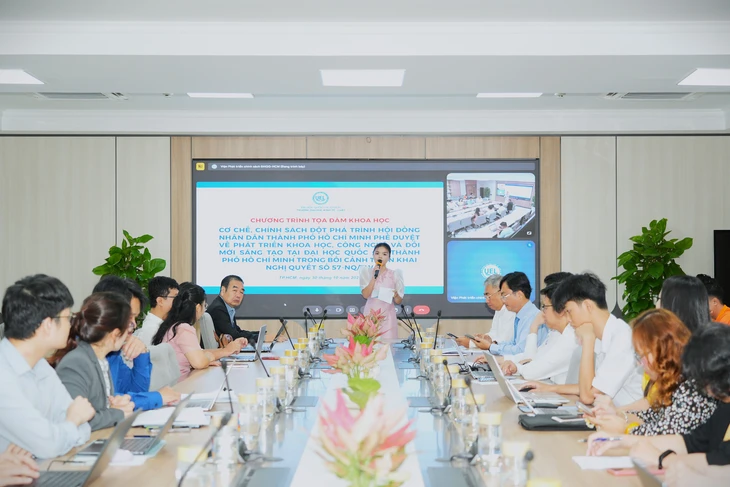
Scientific seminar on breakthrough mechanisms and policies to be submitted to the Ho Chi Minh City People's Council for approval on the development of science, technology and innovation at the Vietnam National University Ho Chi Minh City - Photo: CG
On October 30th, the University of Economics and Law, Vietnam National University Ho Chi Minh City, organized a scientific seminar on breakthrough mechanisms and policies to be submitted to the Ho Chi Minh City People's Council for approval regarding the development of science, technology, and innovation at Vietnam National University Ho Chi Minh City in the context of implementing Resolution 57 of the Politburo .
Institutionalize effective pilot policies in the long term.
Speaking at the seminar, Associate Professor Dr. Do Phu Tran Trinh - Director of the Institute for Policy Development, Vietnam National University Ho Chi Minh City - stated that in the context of Ho Chi Minh City entering a new phase of development as a super-city and a central hub for the region, the country, and the area, the reconstruction of the smart city model requires a foundation based on science, technology, and innovation, while closely adhering to practical requirements for effective urban management, sustainable development, and improving the quality of life for its citizens.
During the period 2026-2030, Ho Chi Minh City could develop a smart city model based on the orientation of "digital government - digital city - digital people - green growth," aiming to build a modern, transparent, efficient, environmentally friendly living environment that places people at the center of all policy decisions.
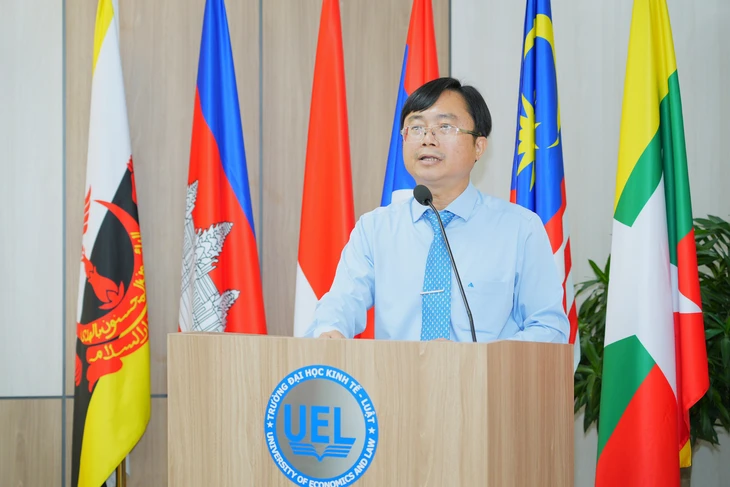
Associate Professor Dr. Do Phu Tran Trinh - Director of the Institute for Policy Development, Vietnam National University Ho Chi Minh City - giving a speech - Photo: CG
Furthermore, the model of cooperation between universities and municipal governments needs to be positioned as an essential mechanism, contributing to both the promotion of knowledge production and technology transfer, and the enhancement of urban governance capacity based on science.
Therefore, Ho Chi Minh City needs to continue improving its institutions, promoting research and development programs, and strongly fostering strategic cooperation between the university system and the urban government in accordance with Resolution No. 57.
Speaking at the seminar, Dr. Nguyen Nhat Khanh from the University of Economics and Law stated that in recent times, the Ho Chi Minh City People's Council has issued many important resolutions related to science, technology, and innovation. Among these, the most notable are resolutions on attracting science and technology experts, supporting the innovation and startup ecosystem, and preferential tax policies for innovation activities.
However, after the merger, Ho Chi Minh City became a regional megacity with a population of 12.5 million. This necessitates expanding and adjusting the special mechanisms to suit the new scale.
Ho Chi Minh City has proactively developed a plan to amend and supplement Resolution 98 to submit to the National Assembly. This includes proposing additional outstanding policies such as a mechanism for selecting strategic investors in high-tech projects, and especially the establishment of the Cai Mep Ha Free Trade Zone with strong non-tariff incentives to attract investment in logistics and high-tech industries on a regional scale.
To further promote these policies, Dr. Nguyen Nhat Khanh suggested that Ho Chi Minh City should proactively propose to the central government the long-term institutionalization of pilot policies that have proven effective. For example, it could propose adding regulations on local venture capital funds or stock exchanges for startups if the pilot program is successful.
In addition to specific and direct policies, Ho Chi Minh City also needs to improve the overall business and research environment, such as reforming business registration procedures, tax procedures for startups (towards online, streamlined processes), and building an open government data system to enable businesses to explore and create new services.
In addition, it is necessary to develop digital infrastructure (5G coverage, data centers) and shared workspaces for the innovation community.
Promoting the National University of Ho Chi Minh City urban area.
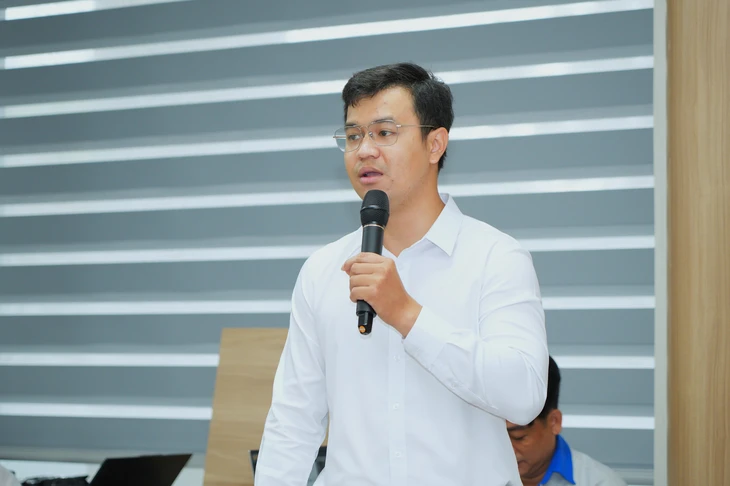
MSc. Le Ba Duc - Institute for Policy Development, Vietnam National University Ho Chi Minh City - presentation - Photo: CG
According to Master's student Le Ba Duc from the Institute for Policy Development, Vietnam National University Ho Chi Minh City, the Vietnam National University Ho Chi Minh City urban area is oriented towards developing into a "smart university urban area" that harmoniously combines training, research, technology transfer, culture, and community services.
This is not only an educational space but also a knowledge center for the Southeast region, contributing to the promotion of science, technology, and the knowledge economy. This model reflects the trend of developing modern universities linked to smart cities and innovation.
However, the practical implementation of the Ho Chi Minh City National University urban area project has revealed many difficulties and institutional shortcomings. The concept of "university urban area" is not yet defined in the current legal system, and the coordination mechanism between the National University and local authorities has not been clearly established.
The laws on land, planning, investment, and public-private partnerships are not yet suitable for the specific characteristics of this model. These legal gaps create numerous obstacles in management, investment, provision of public services, and infrastructure development.
Therefore, experts believe it is necessary to define and legalize the university city model, and to improve regulations on managing shared data between Ho Chi Minh City and the Vietnam National University Ho Chi Minh City.
Furthermore, establishing a comprehensive sandbox mechanism for the National University urban area is an urgent requirement. Based on Resolutions 57 and 98, a separate pilot resolution should be issued soon, allowing the application of a sandbox within the smart university urban area. This will be a controlled experimental legal framework, ensuring both the encouragement of innovation and the mitigation of risks when applying new models and technologies.
Furthermore, a dynamic financial mechanism needs to be established, harmoniously combining the state budget, social capital, and the participation of businesses. The central solution is to establish a University City Development Fund, operating under a public-private partnership model.
A policy is needed to commission scientific research between Ho Chi Minh City and the Vietnam National University Ho Chi Minh City.
According to Master's student Le Ba Duc, Ho Chi Minh City currently lacks specific mechanisms and policies that allow for direct commissioning of large-scale, long-term scientific and technological tasks from the Vietnam National University Ho Chi Minh City.
The effective implementation of the scientific research commissioning mechanism will help connect the knowledge system of the National University with Ho Chi Minh City's smart city development strategy in a substantive and long-term way. This is the foundation for building a "smart university city" model.
Source: https://tuoitre.vn/kien-nghi-co-che-sandbox-va-quy-phat-trien-rieng-cho-khu-do-thi-dai-hoc-quoc-gia-tp-hcm-20251030170759365.htm


![[Photo] Prime Minister Pham Minh Chinh receives Lao Minister of Education and Sports Thongsalith Mangnormek](/_next/image?url=https%3A%2F%2Fvphoto.vietnam.vn%2Fthumb%2F1200x675%2Fvietnam%2Fresource%2FIMAGE%2F2025%2F12%2F16%2F1765876834721_dsc-7519-jpg.webp&w=3840&q=75)

![[Live] 2025 Community Action Awards Gala](/_next/image?url=https%3A%2F%2Fvphoto.vietnam.vn%2Fthumb%2F1200x675%2Fvietnam%2Fresource%2FIMAGE%2F2025%2F12%2F16%2F1765899631650_ndo_tr_z7334013144784-9f9fe10a6d63584c85aff40f2957c250-jpg.webp&w=3840&q=75)
![[Image] Leaked images ahead of the 2025 Community Action Awards gala.](/_next/image?url=https%3A%2F%2Fvphoto.vietnam.vn%2Fthumb%2F1200x675%2Fvietnam%2Fresource%2FIMAGE%2F2025%2F12%2F16%2F1765882828720_ndo_br_thiet-ke-chua-co-ten-45-png.webp&w=3840&q=75)
![[Image] The tenacious fighting spirit of Vietnamese women's football](/_next/image?url=https%3A%2F%2Fvphoto.vietnam.vn%2Fthumb%2F1200x675%2Fvietnam%2Fresource%2FIMAGE%2F2025%2F12%2F17%2F1765990260956_ndo_br_4224760955870434771-copy-jpg.webp&w=3840&q=75)
![[Photo] Prime Minister Pham Minh Chinh receives the Governor of Tochigi Province (Japan)](/_next/image?url=https%3A%2F%2Fvphoto.vietnam.vn%2Fthumb%2F1200x675%2Fvietnam%2Fresource%2FIMAGE%2F2025%2F12%2F16%2F1765892133176_dsc-8082-6425-jpg.webp&w=3840&q=75)






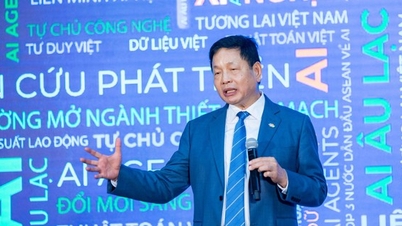


































































![[Live] Closing Ceremony and Award Presentation for the "Impressive Vietnam Tourism" Video/Clip Creation Contest 2025](https://vphoto.vietnam.vn/thumb/402x226/vietnam/resource/IMAGE/2025/12/17/1765974650260_z7273498850699-00d2fd6b0972cb39494cfa2559bf85ac-1765959338756946072104-627-0-1338-1138-crop-1765959347256801551121.jpeg)






















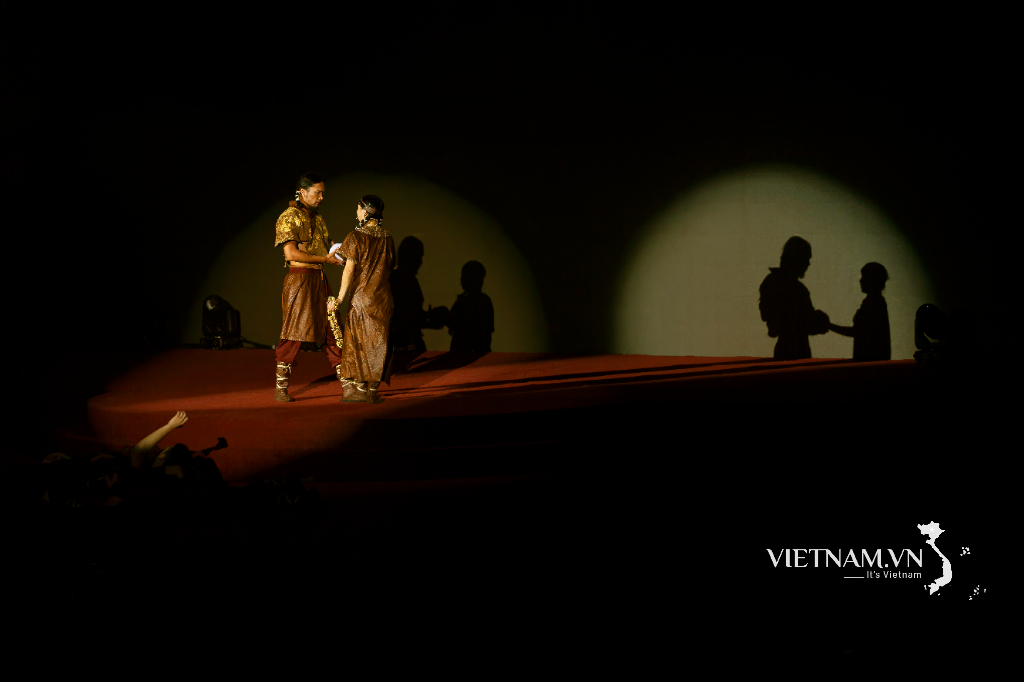
Comment (0)